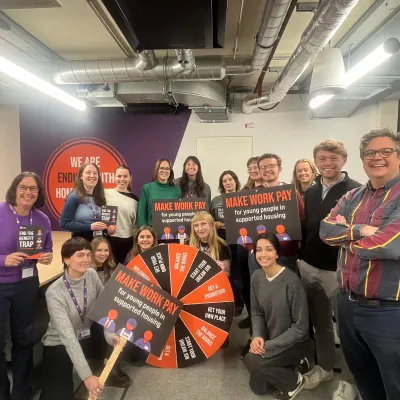Today Centrepoint publishes an interim report into our youth homelessness prevention work in schools. The report has been written by independent experts Nadia Ayed, Suzanne Fitzpatrick, Pete Mackie and Ian Thomas.
Our prevention work is currently based in six secondary schools located across Manchester and London, working with children aged 11 - 16. These programmes use a survey to identify students at risk of homelessness and then, working in partnership with other organisations, deliver a series of interventions including family mediation, health support and homelessness prevention advice.
Today’s report captures the first year of learning in a three-year evaluation of the initiative, drawing on interviews with 19 stakeholders and analysis of the first year of Upstream surveys.
The interim report suggests the pilot has been a success.
Not only has it been positively received by schools, it has already shown to be effective at identifying young people who are at risk of homelessness that might otherwise have gone undetected.
Read the report and executive summary
There are two years left on the evaluation phase of our pilot, where the independent experts will continue to collect and analyse both quantitative and qualitative data, including survey outcome data, and perspectives from young people and families we have worked with.
We’re really excited by the progress already made and looking forward to the next phase of the project’s development with more schools online and pupils and families supported.
We think we the pilot already shows that more English local authorities, academies and schools should be looking at adopting Upstream in their settings too.
We want to help organisations who are experts in youth homelessness set up Upstream in their local area. Get in touch to find out more.
Upstream England follows in the footsteps of Llamau’s ‘Upstream Cymru’ – both projects use the Upstream survey created by Llamau and Cardiff University, which was itself modelled on the successful approach of the Australian Geelong Project.
Key findings
- The sensitivity of homelessness risk as a topic means that the framing of the Upstream initiative both to children and to their parents/carers had to be very carefully handled.
- Homelessness risks were identified using these survey results but also, crucially, drew on follow-up conversations with the young people flagged and input from school staff.
- Key informants reported positive feedback from those children and families who have actively engaged with Upstream thus far.
- There are also some promising early indications of improvements in the circumstances of student supported by Upstream.
- Key learning from this first year of the pilot initiative includes the importance of: bedding in this emerging ‘whole family’ approach in the Upstream pilot; further refinement of data privacy, ethics and consent processes; contributing to the improvement of the survey software and survey tool; and the establishment of a UK-specific ‘fidelity’ statement on Upstream.




